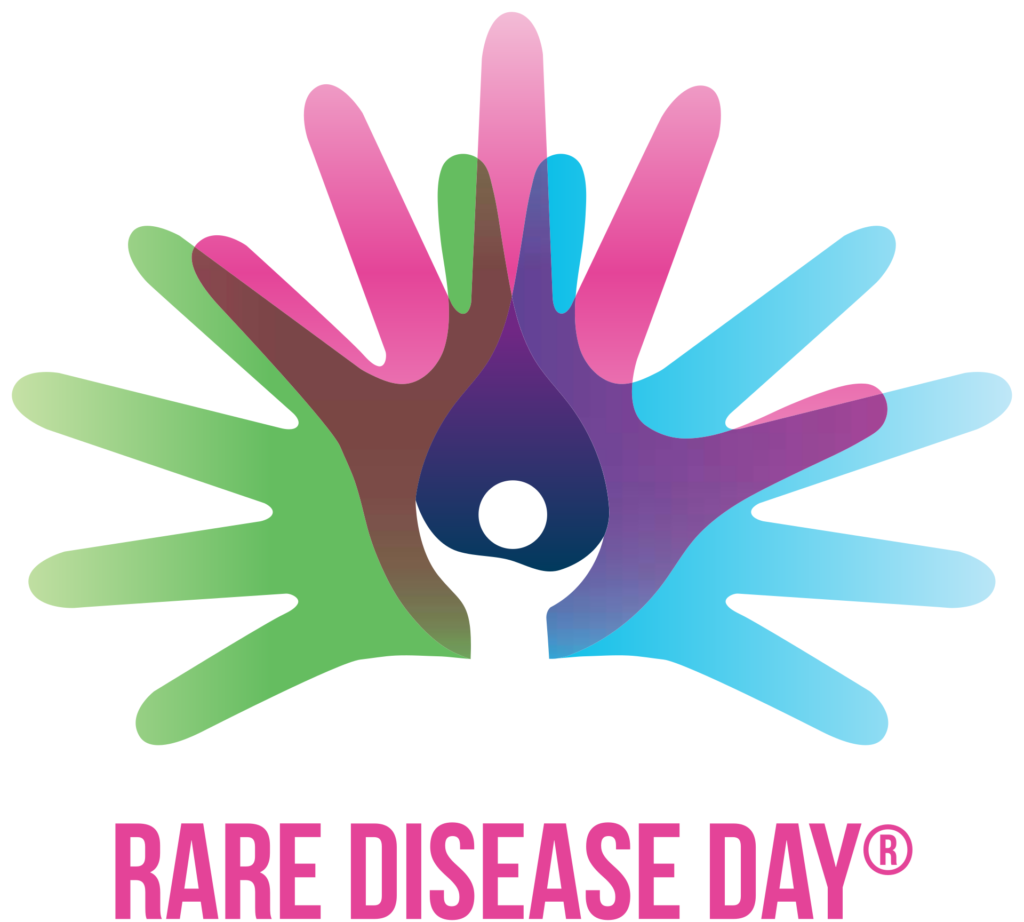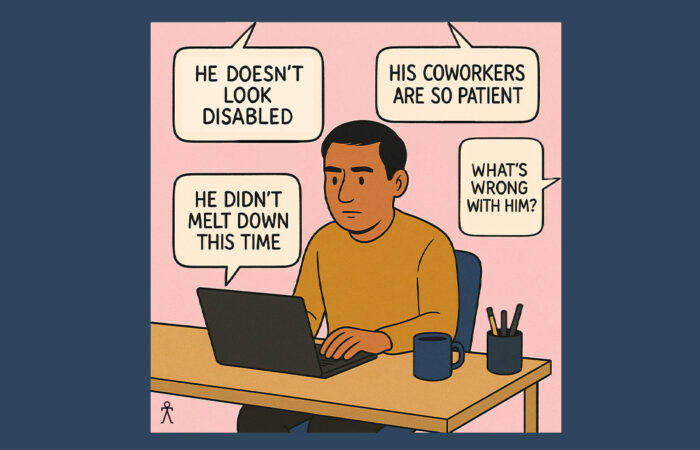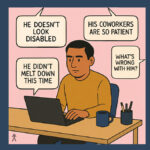By: Menachem Rephun, Creative Spirit Communication Manager

In 2023, the 61 million Americans with disabilities, including the 15 – 20% of the population who are neurodivergent, are still facing record unemployment. Within the disabilities community, another group still has not received adequate representation: individuals with chronic conditions (i.e. rare diseases). According to Rare Diseases.org, over 300 million people worldwide are impacted by over 7,000 rare conditions, which include rheumatoid arthritis, fibromyalgia, diabetes, chronic migraines, depression, and many others. As Harvard Business Review.org points out, “It’s more than likely that someone you work with suffers from a chronic illness — or that at some point, you will.” In the United States, 133 million people are estimated to have at least one chronic illness, according to National Health Council.org. “Our community experiences multiple inequities and vulnerabilities,” Rare Diseases International.org states, “including difficult inclusion and integration in mainstream education systems, discrimination, social exclusion, and a greater risk of impoverishment.” For Rare Disease Day (Feb. 28/29), we’ll explore some of the challenges facing individuals with rare diseases/chronic conditions and how we can improve employment inclusion for this often overlooked community.
As with other disabilities, many employees with chronic conditions are held back by a lack of reasonable accommodations in the workplace. A 2019 survey by Wakefield Research found that 59% of employees were not confident that management knew how to support employees with rare diseases. Meanwhile, 45% of respondents felt that management could have provided more adequate accommodations, including flexible schedules, technology, and special equipment. In the words of Rebecca Nellis, MPP and executive director of Cancer and Careers, “When employers and managers create and reinforce supportive policies, tools, and guidance, navigating workplace challenges for employees with serious medical conditions and their coworkers becomes easier.” Some individuals with chronic conditions have also opened up about the challenges and obstacles they’ve experienced navigating workplaces not designed with them in mind.
“This was a really hard time for me because I thought, ‘Is there a place in the workforce for people like me?’” Hannah Olson, a Boston University graduate with chronic Lyme disease, told Forbes.com in 2019 . Olson ultimately was left with no choice but to leave her job, due to the health demands created by her condition. “I thought there wasn’t a place for chronically ill people,” she said. “I also knew that just because I had these physical limitations, that didn’t mean that mentally my ambitions weren’t intact. Finding the words to explain that to an employer was hard, so I became determined to change that. I knew that I wanted to make a change in this space.” Olson added that she encountered many other people with rare diseases and chronic conditions experiencing the same challenges through Facebook. This inspired Olson to found Chronically Capable, a virtual platform connecting individuals with chronic illness with remote work opportunities. The organization makes a persuasive argument for inclusion, pointing out that according to Accenture and DisabilityIN, companies that champion disability inclusion achieve 28% higher revenue; double the net income; 30% higher economic profit margins; 90% higher retention rates; and a 72% boost to employee productivity. These statistics should motivate all employers to include individuals with disabilities (including chronic conditions) in their hiring practices, and to appreciate why doing so is not a drawback, but can actually be a huge benefit.
Along with understanding that hiring employees with chronic conditions is not a disadvantage, both employers and non-disabled colleagues can make a difference through genuine empathy, which means appreciating the needs and concerns of those employees and job candidates. “Being diagnosed with a chronic illness can be a time of great change,” experts Alyson Meister and Victoria Woolfrey write in an article for Harvard Business Review. “Physiologically, psychologically, and emotionally. Receiving a new (and unwanted) label, those with chronic illness are confronted with questions like: Who am I now that I have this illness? How does my identity change? How does my life, my future, or my career change? How will I cope?” As the authors point out, being diagnosed with a chronic illness often introduces “significant changes to old habits, self-expectations, and ways of working.” In connection with this, employees with chronic illnesses might experience anxiety about being perceived in a negative light (i.e. incompetent or unmotivated) due to the societal stigma often directed against people with disabilities. Employers and co-workers without disabilities should be mindful of these concerns, as well as the fact that people with chronic illnesses are not “lazy”, but often need to be more conscientious about managing a more limited reserve of energy, as fatigue is a common aspect of living with a chronic illness. Sensitivity regarding whether or not employees are open to discussing their chronic condition is also important. “If you’re not sure how to start, you might ask your employee what they think you should know about their illness,” Woolfrey and Meister write. “What needs to be accommodated? What have they learned about themselves and their abilities in managing their illness? Sometimes very small changes can make a huge difference, both physically and psychologically.” For non-disabled employees and co-workers, HBR also recommends managing your own emotional response; challenging and updating your assumptions about what’s “normal”; and being open to adapting and learning about chronic illness, which can in turn lead to creating a more accommodating and accessible workplace.
We’ve covered inclusion advice for employers, but numerous strategies can help those with chronic conditions manage their challenges and grow and succeed professionally. “Your illness is a reality that you need to deal with, and you shouldn’t deny it just because you’re at work,” writes Sammi Caramela of Business News Daily. “If you’re experiencing symptoms, acknowledge and approach them with care rather than working until you crash.” Caramela emphasizes the importance of maintaining a reasonable balance between work and health, as pushing beyond one’s limits can result in poor work quality and health risks. She also suggests preparing for sick days, rather than letting supervisors know at the last minute; researching local sick leave laws; and being familiar with your rights as an employee, including the right to request reasonable accommodations, such as flexibility, extra feedback, and company support. “Overall, those suffering from a chronic condition should look out for themselves,” she writes. “Your illness does not limit what you deserve, nor does it give anyone grounds for mistreatment.”
Living with a chronic condition should certainly not hold you back professionally or make you feel inferior. On the contrary, there are many unique skills that people with chronic conditions contribute, as Hannah Olson notes, including the ability to adapt and change, due to having to adjust to frequent physical, medical, and psychological changes; excellent time management, as your health status has made you more discerning about how you spend your time; and resilience, due to changes in health that teach mental toughness as a result of being consistently challenged and needing to work through new obstacles. Creative Spirit is dedicated not only to connecting people with disabilities with fair-wage employment, but in boosting their overall confidence and self-esteem to ensure professional success. If you have a chronic condition, we hope this article has reshaped your perspective with new, practical strategies and a deeper appreciation of your own unique strengths, talents, and capabilities. If you’re an employer or hiring manager, we also hope we’ve deepened your appreciation for why hiring people with disabilities, including those with chronic conditions, is both ethical and beneficial on all levels, and why erasing the stigma surrounding disability is something that all businesses should strive for.
Sources:
2. https://nationalhealthcouncil.org/wp-content/uploads/2019/12/NHC_Files/Pdf_Files/AboutChronicDisease.pdf
3. https://hbr.org/2021/02/how-managers-can-support-employees-with-chronic-illnesses
4. https://www.wearecapable.org//
5. https://www.businessnewsdaily.com/10041-manage-chronic-illness-at-work.html
6. https://www.idealist.org/en/careers/chronically-capable-tips-job-hunting-chronic-illness-disability






